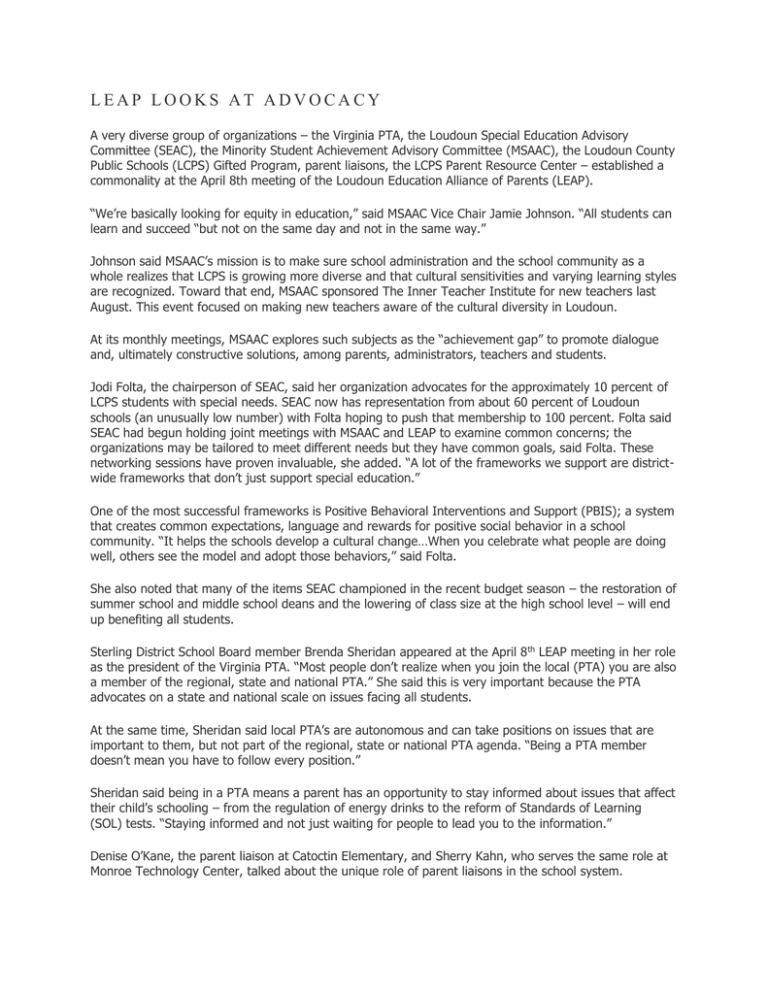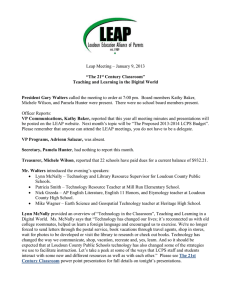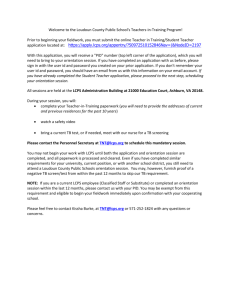L E A P L O O K...
advertisement

LEAP LOOKS AT ADVOCACY A very diverse group of organizations – the Virginia PTA, the Loudoun Special Education Advisory Committee (SEAC), the Minority Student Achievement Advisory Committee (MSAAC), the Loudoun County Public Schools (LCPS) Gifted Program, parent liaisons, the LCPS Parent Resource Center – established a commonality at the April 8th meeting of the Loudoun Education Alliance of Parents (LEAP). “We’re basically looking for equity in education,” said MSAAC Vice Chair Jamie Johnson. “All students can learn and succeed “but not on the same day and not in the same way.” Johnson said MSAAC’s mission is to make sure school administration and the school community as a whole realizes that LCPS is growing more diverse and that cultural sensitivities and varying learning styles are recognized. Toward that end, MSAAC sponsored The Inner Teacher Institute for new teachers last August. This event focused on making new teachers aware of the cultural diversity in Loudoun. At its monthly meetings, MSAAC explores such subjects as the “achievement gap” to promote dialogue and, ultimately constructive solutions, among parents, administrators, teachers and students. Jodi Folta, the chairperson of SEAC, said her organization advocates for the approximately 10 percent of LCPS students with special needs. SEAC now has representation from about 60 percent of Loudoun schools (an unusually low number) with Folta hoping to push that membership to 100 percent. Folta said SEAC had begun holding joint meetings with MSAAC and LEAP to examine common concerns; the organizations may be tailored to meet different needs but they have common goals, said Folta. These networking sessions have proven invaluable, she added. “A lot of the frameworks we support are districtwide frameworks that don’t just support special education.” One of the most successful frameworks is Positive Behavioral Interventions and Support (PBIS); a system that creates common expectations, language and rewards for positive social behavior in a school community. “It helps the schools develop a cultural change…When you celebrate what people are doing well, others see the model and adopt those behaviors,” said Folta. She also noted that many of the items SEAC championed in the recent budget season – the restoration of summer school and middle school deans and the lowering of class size at the high school level – will end up benefiting all students. Sterling District School Board member Brenda Sheridan appeared at the April 8th LEAP meeting in her role as the president of the Virginia PTA. “Most people don’t realize when you join the local (PTA) you are also a member of the regional, state and national PTA.” She said this is very important because the PTA advocates on a state and national scale on issues facing all students. At the same time, Sheridan said local PTA’s are autonomous and can take positions on issues that are important to them, but not part of the regional, state or national PTA agenda. “Being a PTA member doesn’t mean you have to follow every position.” Sheridan said being in a PTA means a parent has an opportunity to stay informed about issues that affect their child’s schooling – from the regulation of energy drinks to the reform of Standards of Learning (SOL) tests. “Staying informed and not just waiting for people to lead you to the information.” Denise O’Kane, the parent liaison at Catoctin Elementary, and Sherry Kahn, who serves the same role at Monroe Technology Center, talked about the unique role of parent liaisons in the school system. Kahn stressed that parent liaisons are LCPS staff, not parent volunteers (although all have been LCPS parents and many have been volunteers). Their mission is simple: “We do whatever is needed to support a student.” Such support can include finding translation services for parents trying to navigate an unfamiliar educational system; connecting students and parents to social services available in the community; helping students overcome food insecurity; and aiding students who are homeless. (Kahn has gotten work boots and cosmetology kits so that students could participate in programs at Monroe.) Parent liaisons work with everyone throughout the county, including one another, said Khan. In that way they find services for students needing medical treatment or the proper clothes for graduation. “We have to be detectives to bring success,” said O’Kane. “Any of these stories can happen to us at any given time.” One thing parent liaisons have to be cognizant of is the pride of the students and parents they serve. O’Kane added that parent liaisons work nights, weekends and vacations, because need doesn’t conform to a schedule. “It’s all good because it’s all for student success. Every day is different. It’s awesome.” Allyson Pate, the professional educator at the Parent Resource Center, noted that, of the 132 school divisions in Virginia, only 40 have an entity like the Parent Resource Center. Located on Union Street in Leesburg, the center is staffed by Pate and parent Pam Spiering. (Pate said their partnership reflects the partnership between an educator and parent.) Pate said the center receives 15,000 contacts each year from parents seeking resources or advice on how to navigate the educational system. “Sometimes they are very reluctant to express a concern when their child is having difficulty.” Pate said she and Spiering work through what is often anger on the parent’s part to find a resolution to their problem. Pate said the center conducted 1,100 one-on-one conversations and small group workshops on subjects such as individual education plans (IEP’s) and transitions for special education students during the past year. Former LCPS Principal Carol Winters, now the acting gifted education supervisor, outlined the LCPS gifted program. This program begins with SEARCH (Seeking Educational Alternatives to Reach and Challenge Higher-level thinking skills) in kindergarten through third grade. Every other week, every student in these grades has a 45-minute session with a gifted teacher. “For four years every student in Loudoun County has the opportunity to work with a gifted educator,” said Winters. From there, fourth- and fifth-graders advance to the FUTURA (Facilitating Understanding Through Utilizing Real-Life Application), which involves students in center-based learning one day a week. Winters said there are multiple criteria for selecting students for this program with no one criterion being paramount. In this way, under-achieving or underrepresented students can be identified as being gifted and given the opportunity to participate in an accelerated program. Students in the FUTURA program automatically qualify for the SPECTRUM (Stimulating and supportive, Pushing the Boundaries, Eager, Candid, Technology, Respect, Understanding, Mavericks) program in middle school. This program enhances and builds upon the SOL objectives with exercises such as starting a functioning business. In high school, SIGNET (Scholars Involved in Gifted Networks of Exceptional Thinkers) is the gifted program. This program involves dual-enrollment courses and Thomas Jefferson High School for Science and Technology, a regional governor’s school. Winters said the balance that must be struck with gifted students at the high school level is to challenge them without overwhelming them. “They are adept and so well-rounded in so many areas, it’s hard to pick out just one. Let them investigate. Give them problems that cause them to really work; persistence in getting to the next level. They don’t want it easy.” May 13th will be the last LEAP meeting of the 2014-2015 school year. This will be a presentation from the Loudoun County Sheriff’s Office concerning the dangers facing teens in our community. This meeting also includes the election of LEAP officers for 2015-2016.




